Former Tamil Tigers set to contest upcoming Sri Lankan election
Former terror group, the Tamil Tigers of Sri Lanka, was notorious for its past atrocities that together with the government’s retaliation led to at least 80,000 casualties in less than three decades. Six years after their defeat, ten former members will contest the country's upcoming election.
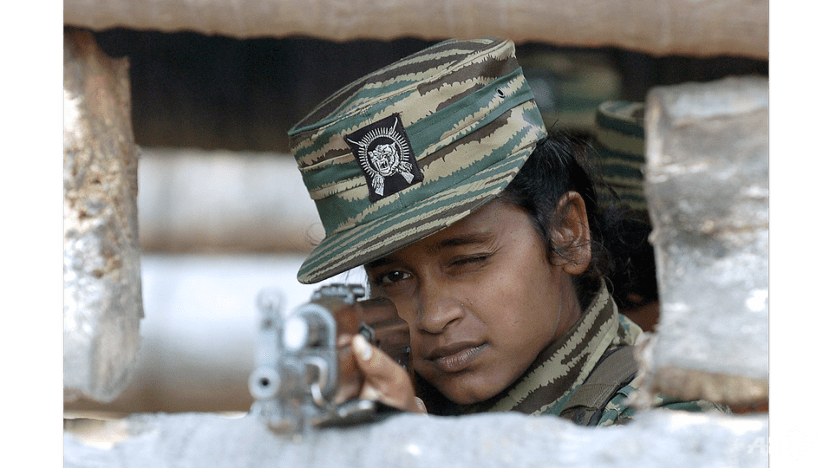
Female Tamil Tiger aims her weapon as she stands in a bunker near the rebel front north of the Tiger-controlled town of Kilinochchi. (Photo: Lakruwan Wanniarachchi/AFP)
JAFFNA, Sri Lanka: Sivanathan Navindra was once known as Venthan, a former bodyguard of the slain Velupillai Prabhakaran, leader of the world’s deadliest terrorist organisation at the time, the Tamil Tigers.
When Sri Lanka goes to the polls on Aug 17, Mr Sivanathan will be a candidate, hoping to be elected as a member of parliament.
Despite the scars and lingering legacy of the bloody, three-decade-long conflict, he said the war was a closed chapter in the country’s history that should not be brought up again.
“Nothing is going to happen to us by talking about what has happened. Our people are not going to benefit from discussions about the past,” said the 32-year-old ex-cadre, who joined other former Tigers in forming a new political group, Crusaders for Democracy (CFD).
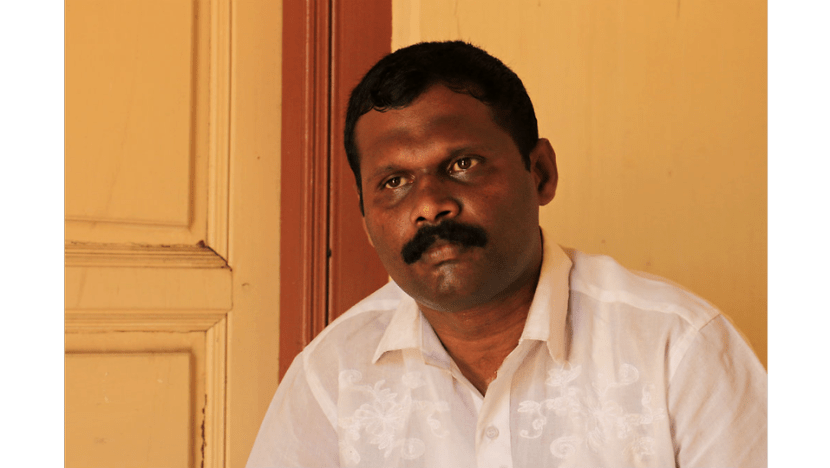
Former Tamil Tiger cadre Sivanathan Navindra. (Photo: Pichayada Promchertchoo/CNA)
Rather than past atrocities, Sivanathan urged Sri Lankans to focus on pressing issues faced by the country and work together to solve them through democratic means.
“After the end of the war in 2009, there were losses among our people due to the armed struggle. So in order to find appropriate solutions for them, our group has decided to seek democratic recourse.”
But past violence will not be easily forgotten.
Formally known as the Liberation Tigers of Tamil Eelam (LTTE), the guerrillas waged war against the Sri Lankan government to try and form an independent state of Tamil Eelam for nearly three million Tamil minorities in the north and part of the eastern region.
Described as “the most dangerous extremists” by the FBI, the LTTE became infamous for the use of suicide bombers or “Black Tigers”. Between 1987 and 1999, the group claimed to have carried out 147 suicide operations.
From 1983, their movement was met with brutal retaliation from the military. As a result, up to 100,000 people died and more than one million were uprooted from their homes, according to the United Nations High Commissioner for Refugees (UNHCR).
GRIEVANCES OF TAMILS
It was not until recently that Sri Lankans came to know Crusader for Democracy and the men behind it, ten former Tamil Tigers who had spent years undergoing a state-backed rehabilitation process. Their political comeback was largely driven by bitter resentment towards the government’s handling of Tamil war victims.
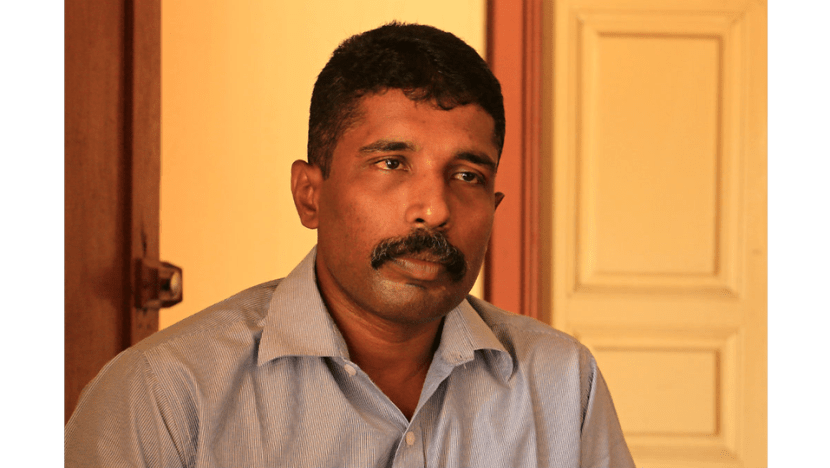
Former Tamil Tiger cadre Thankaraja Thevathasan. (Photo: Pichayada Promchertchoo/CNA)
“Everywhere on the Tamil homeland, people have been severely affected, all of them, especially during the final stages of the war. The conflict has left them with pain and deformity that can never be fixed,” said ex-LTTE cadre and CFD contestant Thankaraja Thevathasan, also known as Kankai Aathman during his years on the battlefield.
Besides direct impact of the war, Mr Thankaraja also stressed the current situation where the Tamil minority continue to face discrimination and inequality, a deep-rooted problem formed during the post-colonial era. “Tamils have been discriminated and our livelihoods deprived,” he said.
Home to some 20 million people, Sri Lanka is dominated by ethnic Sinhalese, who make up almost 80 per cent of the total population. But following its independence from the colonial rule in 1948, the country witnessed a surge in Tamil nationalism.
The movement was primarily fuelled by growing resentment among the Tamil minority against discriminatory public policy of the Sinhalese government, which eventually snowballed into the 26-year war.
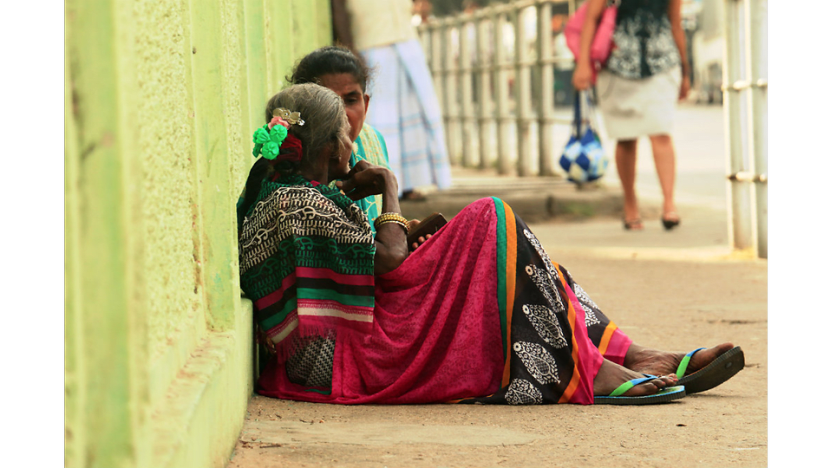
Tamil women sit on the pavement in Jaffna. (Photo: Pichayada Promchertchoo/CNA)
“The root cause of the conflict is about discrimination and denial of rights to a particular community, the Tamil community,” said human rights activist Ruki Fernando, stressing the problem remains “unaddressed” six years after the war.
“People believe that Sri Lanka belongs primarily to the majority Buddhist Sinhalese and the rest are just visitors, secondary or inferior citizens who don’t have equal rights or ownership of this country.”
According to Mr Fernando, Sri Lanka could face another war if the current situation does not improve. He said as long as the Tamil community feels they are not able to govern their own people, "there will always be a possibility or risk of conflict or even war happening again some decades down the line”.
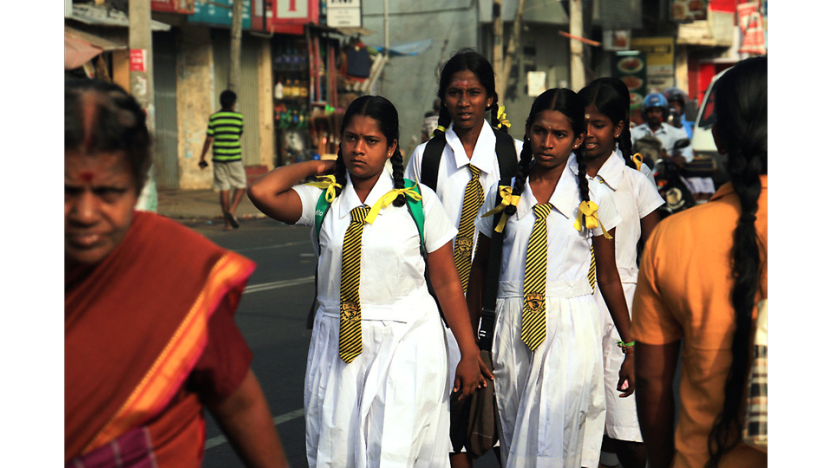
A group of female students walk to school in war-torn Jaffna. (Photo: Pichayada Promchertchoo/CNA)
His view, however, was dismissed by CFD members, who otherwise agreed that the government, including Tamil politicians, had not taken any serious actions to address the Tamil grievances, six years after the war.
“We are being forced to seek a concrete solution. We have only seen empty slogans time and again, tricking people. We have never had politics that is based on reality. We wish to participate in politics that is real,” Mr Sivanathan said.
“This time, we are engaged in democracy,” Mr Thankaraja added. “From now on, our actions for the public as well as the next generations will be in such a way that nobody will have to resort to violence ever again.”
‘THEY LOCKED THEIR HEARTS’
After decades of armed conflict, an estimated 12,000 LTTE cadres entered a rehabilitation process spanning 28 facilities. The programme was designed and supervised by the Sri Lankan army under former President Mahinda Rajapaksa.
During their rehabilitation, the ex-Tigers were taught to understand how to address their grievances in a non-violent way.
“Basically, we enhanced their understanding. We enhanced their knowledge so that they became ‘balanced people’,” explained General Daya Ratnayake, former Commander of the Sri Lankan Army and Commissioner General of Rehabilitation for former LTTE combatants.
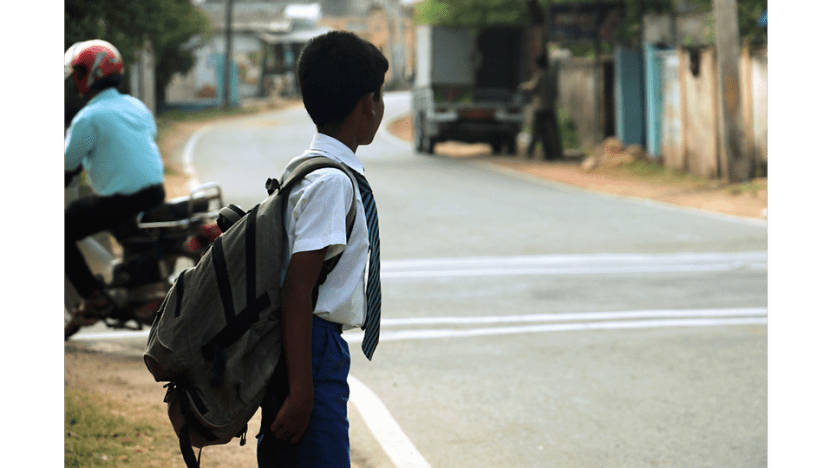
A male student on his way to school in Jaffna. (Photo: Pichayada Promchertchoo/CNA)
According to him, the LTTE cadres had had their hearts “locked” by terrorist experts who used their grievances to manipulate their minds.
“There are three main elements in a human body that has to be synchronised for you to be a balanced, disciplined individual. That is head, heart and hands or the psychological aspect, the spiritual aspect and the vocational aspect,” the former army commander said.
During the transformation of these innocent people to be the most dangerous terrorists, the terrorist organisation basically locked their heart when they were taken in. So when your heart is locked, you can be extreme.”
Through various training processes, the terrorist organisation would separate the cadres from society and deprive them of information, keeping them in an environment where they were fed with extremist ideology as well as military training.
‘FINAL RECONCILIATION’
Despite the defeat of the LTTE, threats from extremists still exist within and beyond present-day Sri Lanka, where a sharp divide between the Tamil minority and Sinhalese majority remains unsettled.
“They are very well structured and organised,” General Ratnayake said. “They are, on a daily basis, trying their best – with the help from many other organisations and individuals – to destabilise this country, trying to divide the country.”
According to the former army commander, the threat of extremism will never be eliminated as long as the minority’s grievances remain unanswered. “This is called final reconciliation. Until you achieve final reconciliation, these things will exist. It is the responsibility of the government and the society and everybody to get together and talk to each other and settle these things nicely.”

A Tamil woman and a child inside a shelter for people displaced by the war in Jaffna. (Photo: Pichayada Promchertchoo/CNA)
However, the definition of reconciliation differs in the multiethnic society, where state power is centrally controlled by the Sinhala-dominant government.
“For the Sinhalese, the reconciliation means the opportunity to assimilate with us, whereas for the Tamil, it means the opportunity to live out our differences and to create a space where we can be Tamil and not to be assimilated,” said Sri Lankan analyst Dr Nishan de Mel.
However, a genuine relaxation and devolvement of state power to the provinces may prove challenging for the two major Sinhalese parties in Sri Lanka, the United People’s Freedom Alliance (UPFA) and the United National Party (UNP), both of which are busy making campaign promises to voters ahead of the parliamentary election.
In northern Jaffna and and Killinochchi, Mr Sivanathan and his party members continue their campaign for Tamil minorities with hope that a new era will dawn in the north.
As for many Sri Lankans, slogans of national harmony, reconciliation, equality and multiculturalism have become all too common as Aug 17 draws closer.
The Tigers Return is the second part of a digital series on Sri Lanka six years after the war. The series will be released daily until Aug 17.












